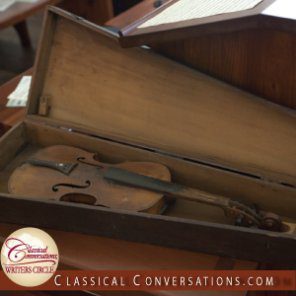Preface: I am writing from the perspective of my passion for music. There are countless other passions and areas of interest where the following ideas could be applied. I am not writing as if everyone should approach music a certain way. I am writing that everyone should approach his or her appropriate passions with integrity and sacrifice.
When I first became inspired to appreciate classical music, I listened to it while I worked, while I drove my car, while I read, and even sometimes while I slept. I did this because I wanted to build good listening habits and I hoped that the more I experienced classical music, the more I would eventually come to understand it. I believed that enough encounters with the beauty of music would make me love and appreciate beautiful music. But my progress was minimal and I became frustrated in my attempts to appreciate this “foreign” art. I felt like a wannabe. I felt like a poser. I respected the people who were telling me I should love and appreciate classical music, but I had no idea how to appreciate good music. Is listening enough?
Have you ever listened to a piece of music and thought it to be beautiful but could not come close to describing or analyzing why it was so beautiful? I assume many of us have felt this way about classical music, a beautiful painting, or other forms of art. I want to suggest that the recognition of beauty is not the goal or end result of why we should engage with art. To be content in an experience of beauty for the sake of the experience itself is a self-centered form of appreciation. The recognition of beauty should be the means by which we are pulled into the reality behind what makes something beautiful. As humans, we are not made to be merely spectators of beauty. In fact, in many cases, becoming a connoisseur of beauty carries the risk that we develop snobbery and arrogance about our experiences with beauty and art. We were not created to merely perceive or observe beauty; we are made to live beauty.
We are called to glorify God, and to enjoy Him forever. Just as this does not mean we are to passively observe Him interminably, but rather to actively worship Him eternally, our enjoyment of His gift of music will grow stale if it remains passive experience and does not grow into active engagement. Part of the struggle to understand beautiful music stems from a fundamental misunderstanding about its purpose. We often mistakenly view beauty, and beautiful music in particular, as something to consume rather than something to pursue. Few recognize the study of music as an opportunity for worship. Yet, in ancient and medieval culture, music was studied in order to witness the created order. Music was training to know God so that individuals would come to understand wisdom and live beautifully—to live in obedience to their Creator and in harmony with their Savior.
If we attempt to passively consume compositions from this era—a time when music was understood to be much more than is expected of it today—much is lost. So many layers of their beauty are revealed when they are studied, sung or played, and then taught to others. Because Renaissance and Baroque music was not written to be background music as it is commonly used today, to be properly appreciated, it must be dissected, analyzed, and paralleled to the wonderfully created order around us. To do this well, the elements of music must be studied. Studies in rhythm, melody, harmony, timbre, dynamics, texture, and form help the student know what to listen for in order to discern beauty and excellence in music within different contexts. Ideally, this kind of musical training allows one to more fully appreciate God’s wisdom and beauty as it appears in all aspects of life.
This level of appreciation and study requires time, energy, and commitment. To understand beauty in order to live beautifully takes sacrifice. In part, I believe it is sacrifice that we knowingly or unknowingly recognize in a beautiful piece of music that we cannot explain. We recognize the sacrifice of the composer. We recognize the long years of practice needed to obtain the skill we are witnessing. We recognize the gifts he was given by God. But do we recognize the call for beauty in our own lives?
All of us desire fulfillment, and we all desire to encounter beauty. Yet not all of us respond to the burden of living a beautiful life, living a sacrificial life. To be human, in the way that reflects the Imago Dei, means to live beauty the way Jesus lived it. Suffering and sacrifice go hand in hand with the Imago Dei. In this way, our suffering and sacrifice become our joy. We learn to love the hard work of playing scales for hours on end because we know that sacrifice is beautiful. We learn to value hard work, and we discover that, as Jesus modeled for us, what is difficult is often most worth doing. The purpose of beauty is not just to encounter beauty. The purpose of beauty is to help us live glorified lives through sacrifice.
In what ways has sacrifice in your life taught you about beauty? Comment below.




